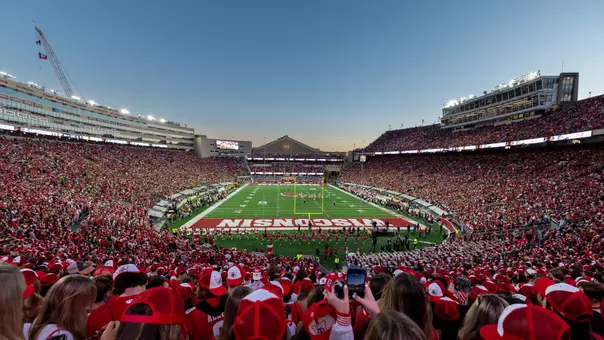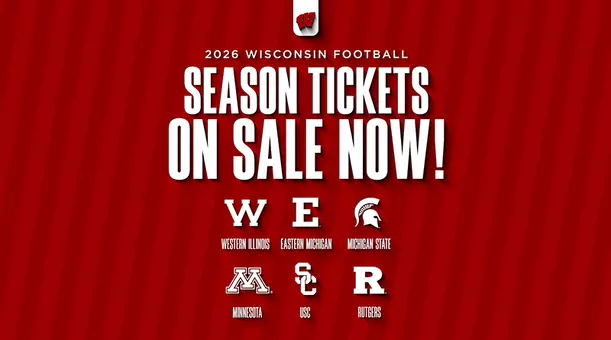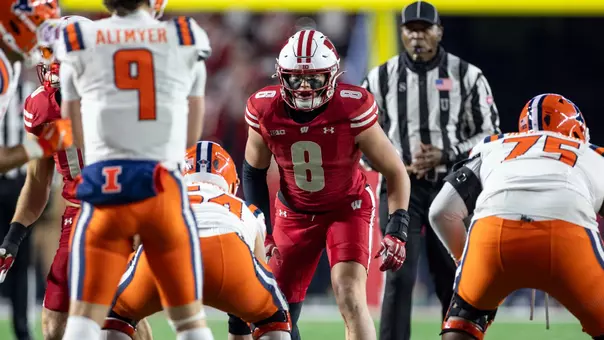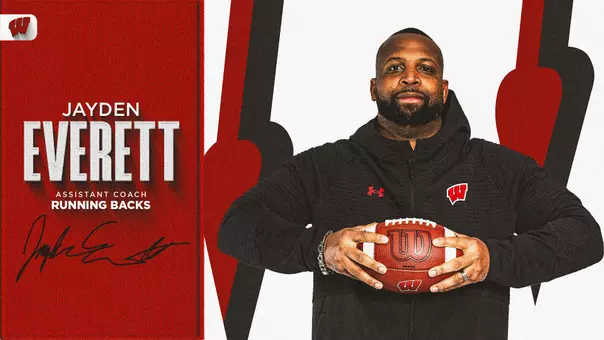Dream Season Postscript: Wisconsin at Northwestern, 1997
September 26, 2020 | Football, Mike Lucas
Badgers’ 8-5 campaign in ’97 set stage for Rose Bowl runs
 |
|
|
BY MIKE LUCAS
UWBadgers.com Senior Writer
MADISON, Wis. — Despite injury setbacks (shoulder, groin, ankle, knee) sidelining him for 12 quarters (including two full games), Ron Dayne still rushed for 1,457 yards (good for fifth nationally) as a sophomore in 1997 while expanding his Heisman marketing brand to "Wisconsin's Great Dayne."
By so doing, he lent his name and support through public service announcements, billboards and a poster — Dayne was pictured with four Great Danes — as part of the Dane County Humane Society's campaign promoting the theme of "Humane Treatment of Animals, Not Linebackers."
 There was truth in advertising, too.
There was truth in advertising, too.
Dayne loves dogs. As a youngster, he had a Doberman pinscher named Butch.
"It's important to give back to the community which we've done as a team," said UW head coach Barry Alvarez who grew up in Burgettstown, Pa., with a dog and saw the benefits from Dayne's involvement locally in a good cause.
"The Humane Society is in the business of adopting animals," pointed out Mary Paul Long, the director of development and communications for the Dane County Humane Society. "This is the first time we've been adopted and no less by a Badger."
Here are some more tidbits from the Badgers' 1997 season:
Streak Busters
With 9:16 left in the first quarter against Iowa (Nov. 8), Dayne twisted his ankle and limped off the field. Without their No. 1 offensive weapon, the Badgers fell back on their defense and special teams to upset the No. 14-ranked Hawkeyes, snapping a 21-year winless streak (0-17-1) in the series.
Iowa, the top scoring team in the nation, was stopped three times on fourth down and failed to score on a first-and-goal from the 4. Kevin Stemke averaged 46.2 yards on six punts, nullifying the dynamic Tim Dwight, who was held to one return, while Eddie Faulkner rushed for 119 yards and his first career TD.
It Starts Up Front
In 1996, Chris McIntosh was the wide-eyed newcomer; a redshirt sophomore and a first-time starter at left tackle on a Wisconsin offensive line that revolved around four fifth-year seniors (Manny Castro, Jerry Wunsch, Jamie Vanderveldt and Derek Engler).
A year later, McIntosh was the mentor for three redshirt freshmen (Bill Ferrario, Casey Rabach, Dave Costa) and a converted, jumbo-sized tight end (Aaron Gibson) at right tackle. As a unit, they had growing pains. Yet they matured together in opening holes for Dayne, Faulkner and Carl McCullough.
The Badgers had recruited a junior college center, Coleman Johnson, to replace Engler. But he suffered a knee injury during spring practice, creating a spot for Rabach, who became the first UW freshman to start at center since Cory Raymer in 1991.
McIntosh, Rabach, Ferrario and Costa made up the O-line foundation for two Rose Bowl teams.
Close Shaves
Northwestern was one of three one-point victories in 1997. Never before in the 109-year history of the program had the Badgers ever had such a hat trick. In fact, only one program in Big Ten history — Michigan in 1937 — had collected three victories by one point in the same season.
In addition to Matt Davenport kicking Wisconsin to wins over Indiana (27-26) and Northwestern (26-25), the Badgers held off Minnesota, 22-21, in the Metrodome. Protecting that one-point lead, they started their final drive on their own 29-yard line with 4 minutes and 47 seconds left in the fourth quarter.
Ten plays later it ended on the Gophers' 33. Dayne had eight carries, Mike Samuel had two. It was pretty obvious that the Badgers were going to milk the clock and Dayne was going to get the ball in this situation. But the defense couldn't stop him. Dayne finished with 40 rushes for 183 yards.
"I told Ron after the game that I felt down the stretch he played as well as he has played here," Alvarez said. "As far as finishing runs, making something out of nothing, straining, giving second and third efforts to run that clock out, I haven't seen him better. He was really hammering it in there."

Staying Connected
Wisconsin traveled to Minneapolis without wide receivers coach Henry Mason, who was hospitalized on Tuesday of game week after experiencing some neck pain and numbness in his arms. Mason, who had been suffering from a couple of herniated discs, had fusion surgery that night.
To accommodate for his physical absence from the sideline, the receivers used a cell phone to talk with Mason, who got out of the hospital on Thursday and was watching the game on television from his Madison home. Mason relayed information to his players between series.
"I didn't have a great vantage point to be able to see all of the coverages," Mason said. "But just being able to hear the same conversation that they normally hear during game day may have helped them. I know just having some contact with them helped me."
While Tony Simmons endorsed the setup — "There was no drop-off. It was just like having Coach Mason right there with us" — Donald Hayes had more trouble adjusting.
"We were going to keep the phone line open," Mason said. "But Donald kept forgetting and kept hanging up on me. It would be like, 'Donald this is what you've got to do,' And he'd say, 'OK.' And the phone would go dead. But he'd call back."
After the team returned to campus, the wide receivers took the Axe to Mason's home.
"That meant a lot to me," Mason said.
It's a Snap
Long Snapper U? Mike Schneck, who was injured celebrating Davenport's game-winning field goal against Indiana, played 11 seasons in the NFL with the Steelers, Bills and Falcons. In 2005, he was named to the Pro Bowl. Mike Solwold, who replaced Schneck against Northwestern, also played a handful of seasons in the NFL with the Vikings, Cowboys, Bucs, Ravens and Patriots. In 2002, he broke his foot in the fourth game but still got a Super Bowl ring with Tampa Bay.
On the Money
The Badgers converted on just 14 of 31 (.452) field goal attempts between 30-49 yards over the previous three seasons. Or prior to the arrival of Davenport, who was 13-of-15 (.867) from that range in 1997. Along with being a semifinalist for the Lou Groza Award, he was recognized as first-team All-Big Ten by the coaches, UW's first all-league placekicker since Rich Thompson in 1992.













